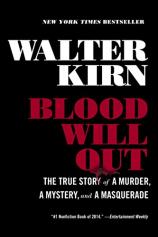Blood Will Out: The True Story of a Murder, a Mystery, and a Masquerade
Review
Blood Will Out: The True Story of a Murder, a Mystery, and a Masquerade
July 2008 brought one of those strange stories that seem to surface each year to interrupt our summer torpor, as the media reported that a man known as Clark Rockefeller was wanted for the kidnapping of his seven-year-old daughter in Boston. When the police caught up with him in Baltimore, they soon discovered their quarry didn't occupy even a remote branch on the tree of the prominent American business and political family. Instead, he was a German immigrant named Christian Karl Gerhartsreiter, whose tangled life story yielded more questions than answers.
That incident inspired Amity Gaige's 2013 novel, SCHRODER. Now, novelist (UP IN THE AIR, MISSION TO AMERICA) and journalist (LOST IN THE MERITOCRACY) Walter Kirn has fleshed out Rockefeller/Gerhartsreiter's bizarre past in this complex, troubling and, above all, self-revealing account of his 10-year friendship with the serial imposter, someone Kirn thought of as "a singular figure in my life and a subject of frequent contemplation."
If ever a friendship started under unusual circumstances, it was this one. In the summer of 1998, Kirn, married and living on a heavily mortgaged Montana ranch with his first child on the way, was enlisted to transport a crippled Gordon setter to Rockefeller, who had purchased the dog online from acquaintances of Kirn’s wife. From their first encounter in New York, when Rockefeller, a self-described "freelance central banker," proposed an after-hours tour of Rockefeller Center ("the family's place") that never materialized and invited his new friend to his apartment (next door to Tony Bennett's, he said) to show off his collection of Rothkos and Motherwells, the relationship, in Kirn’s mind, was never one of equals.
"While few of us will ever encounter the sort of sociopath Kirn portrays here with such precision, his chilling memoir offers a disturbing reminder that our capacity for self-deception is nearly limitless."
But Clark's lies weren't limited to non-existent jobs or works of art that turned out to be fakes; he also claimed friendships with an absurdly large and diverse collection of celebrities, from Britney Spears to Germany's Chancellor Helmut Kohl. In 2002, Kirn visited Clark's ramshackle farmhouse in Cornish, New Hampshire, hometown of J.D. Salinger, where Rockefeller dangled the prospect of introducing Kirn to the reclusive novelist. When Kirn offhandedly mentioned a problem with the IRS, Rockefeller handed over what he said was then-President George Bush's private phone number (a number Kirn never dared to try).
Even at his best, Rockefeller's creepiness seemed to have outweighed his charm. Despite finding Clark "instantly annoying" and despite the implausibility of just about everything the man said, even after the 2008 kidnapping, Kirn was willing, for a time, to suspend his disbelief. Whether that credulousness resulted from his awe at his friend's pedigree, or the fact that for a time they had shared the status of divorced fathers, he eventually concedes his involvement in an "unbalanced, insulting relationship that had gone on too long and grown disfiguring."
By the time Kirn found himself covering Rockefeller's 2013 Los Angeles trial for a 1985 murder (committed while he had assumed yet another identity as a minor British aristocrat) that involved burying the victim's dismembered body in plastic bags, any empathy he may have felt for his one-time friend had been burned away. Possessed of that emotional freedom, Kirn crisply describes a case in which "not only was the evidence circumstantial, so was the defendant," as a parade of other self-deceived witnesses took the stand while Rockefeller watched, seemingly detached (as one might expect from a man so adept at shedding his identity only to assume a new one) from the often grisly narrative unfolding before him. Kirn connects Rockefeller's story to novels like Patricia Highsmith's THE TALENTED MR. RIPLEY, concluding, somewhat melodramatically, that Rockefeller, also a fan of film noir, "killed for literature."
Visiting Clark in jail after his murder conviction, Kirn found him "still portraying the man I'd known, a patrician Lotos Club member, unceremoniously displaced." But the act of producing this book afforded Kirn a certain measure of revenge against his deceiver, as he admits he'd considered writing about Rockefeller when they'd met, but had abandoned that plan "in deference to our friendship." Given the foundation of duplicity on which their relationship had been constructed, he doesn't find that about-face at all troubling: "Writers exist to exploit such figures," he concludes. "Our duty is to the page, not the person."
Kirn's self-portrait suggests a judgment on himself that’s almost as harsh as the one the justice system rendered against Clark Rockefeller, a man who, from the first, was more a construct than a human being. "Rationalizing, justifying, imagining," he writes, "I'd worked as hard at being conned by him as he had at conning me. I wasn't a victim; I was a collaborator." While few of us will ever encounter the sort of sociopath Kirn portrays here with such precision, his chilling memoir offers a disturbing reminder that our capacity for self-deception is nearly limitless.
Reviewed by Harvey Freedenberg on March 21, 2014
Blood Will Out: The True Story of a Murder, a Mystery, and a Masquerade
- Publication Date: March 30, 2015
- Genres: Nonfiction, True Crime
- Paperback: 272 pages
- Publisher: Liveright
- ISBN-10: 1631490222
- ISBN-13: 9781631490224




